
Blog: Sunshine in a Time of War: Palliative care and cancer care in Sudan
![]() Cairdeas
Cairdeas
![]() 12th March 2024
12th March 2024
This blog was submitted by Dr Nahla Gafer, our Cairdeas IPCT lead for palliative care in Sudan.
Almost a year ago, all our worries at the palliative care unit were how to establish home care in a systematic way as to be available to all patients nearing the last phase of their lives. The palliative care unit was formed of volunteers working at the main oncology hospital in the country. The unit had (by then) completed 13 years since its initiation and had established an outpatient clinic with > 50 patients coming twice a week, in addition to the inpatients and the home care visits.
No one had expected a war, and our world was turned upside down. I was worried about my colleagues, family, and friends but I was more worried about my patients. GA is a 35-year-old lady with a devastating vulval tumor. She cannot sit straight; in public transport she needs to lie on her side. Her pain was controlled by 6 tablets of 15 mg of morphine every 4 hours. We reached a point of convincing her to try a mild chemotherapeutic agent, after her last chemotherapy treatment, which was 2 years ago, and during which she had severe side effects, and was very reluctant to go back to chemotherapy. At last, we had a promise from her to try this mild chemotherapy after Eid. Then the war came.
AK had multiple ulcers from his squamous cell carcinoma, now running havoc all over his face, neck, back, limbs, etc. It did not help at all that he was albino, and my role was not only to find alternative ways to reduce the disfiguring masses and control the oozing and pain, but also to support him, and help tackle his psychological and social issues. OA is a lovely girl of 12, being informed by her attending physician, that nothing more can be done for her, her mother came to the unit seeking support. Building up her general condition and managing her pain, she was back on tract on active treatment with good response. She went on to speak on breast cancer month, to schoolgirls her age saying that the disease is a test to her faith, and that endurance brings one nearer to God. She thanked her family and treating physicians and really showed how one can really be so strong in spirit inside a weak body. For some months after the war, we lost contact.
Those are a few of almost 1,000 patients we were serving when the war broke out. The first priorities once the war started was to go to a safe area and ensure you have food. There are certain things that are already lost: your property, house, furniture, car, office, whatever you previously had, and your source of income. All forms of normal life, including work, stopped; the internet was so weak that a message sometimes takes a week to get through, and our local internet banking was not functioning. After this was sorted out, we were still so worried about our patients and about our colleagues.
The international community stood by us, and through donations, we were able to mobilise our colleagues and their family members outside of the hot conflict areas. A plan was set with Cairdeas International Palliative Care Trust (Cairdeas IPCT) and SANAD The Home Hospice Organization of Lebanon, to support the team members, some of whom had remained in war zone areas for 3 months. We then created “Sunshine in a Time of War,” a project by Cairdeas IPCT and SANAD The Home Hospice Organization of Lebanon aimed at supporting the palliative care unit. Even before the project was implemented, just the idea that you matter to someone and that someone is ready to help, gave the team members a lot of strength.
Sunshine in a Time of War holistically supported the palliative care team in Sudan. Psychological support to the members of our palliative care unit was very important, and we needed to provide debriefing and psychological first aid (PFA) training. This resulted in multiple contacts with team members from those from SANAD The Home Hospice Organization of Lebanon, who assessed how they were doing, providing debriefing and referral to local services for psychological support, as well as offered training through a video series posted on YouTube. Financial support to the team was also essential, which included providing for their phone and internet assess while working as well as supporting their salaries, organised by Cairdeas IPCT. [Many thanks to the generous supporters and friends of Cairdeas IPCT, who played a large role in supporting our palliative care colleagues in Sudan!]
During the Sunshine in a Time of War project, we faced several challenges. For example, no one could reach the hospital, where we had the computer with all patients’ data, their contacts and their family members contacts. We had to find another way to reach the patients as soon as possible and as many as possible. We collected all numbers we previously had in our smart phones, especially from the nurse who was had the habit of calling patients the second day following on their pain medications. The team members started reaching out to patients through telephone calls, WhatsApp and messenger text and voice messages. The main purpose was to check on their security, advise them with practical issues, as well as check on their disease and what to do about it.
More than 400 patients were reached, all documented nicely in ledgers kept in a make-shift office, in a remote city, in the north. We made sure to record the diagnosis, time of diagnosis, stage, previous anticancer treatment received, current complaints and current situation. The 10 years of work at the palliative care unit made our team very competent in palliative care and in oncology, especially in managing all problems: physical, psychological, social, and spiritual. At times, when there was need for further consultation, myself and another two doctors were reachable by WhatsApp. The palliative care unit were also able to contact SANAD The Home Hospice Organization of Lebanon, for psychological support for themselves, the patients and their families. While the palliative care unit no longer existed as a physical place, it turned into a virtual network connecting 400 patients with 8 Sudanese staff and 4 Lebanese staff, supported by Cairdeas IPCT and SANAD The Home Hospice Organization of Lebanon.
The amount of support we could give to the patients remotely is amazing. Even end-of-life care was conducted remotely. KA had liver metastasis that affected his liver function, but the family was not aware how terminal he was. A series of calls to the family was very helpful in exploring his current complaints, checking the signs of eminent death (examining the mouth ulcers, other complaints, etc.), explaining what was beneficial and what is not through family meetings conducted with the family members in a separate room, and the camera directed to the person who was speaking. Yes, it is possible to conduct virtual family meetings as well as virtually assessing symptoms, discussing with the patient, directing, and even prescribing medications. (Prescriptions were written, photographed, sent by WhatsApp to the family.)
We received several messages of thanks and gratitude from the patients and their family members. Yes, we helped them, they needed us, but also, we needed to preserve the work that we had started; we needed to help our patients. It is part of who we are. This way we are really healing, caring and humane health professionals.
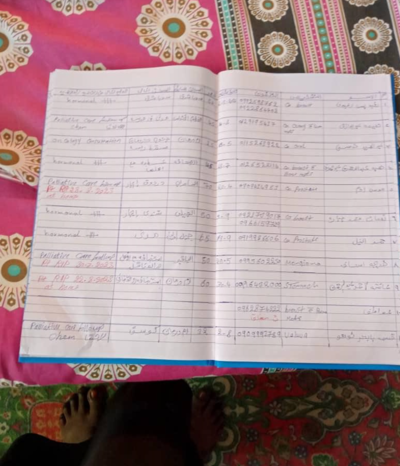
Record-keeping is now pen and paper, WhatsApp photos and chats when possible.
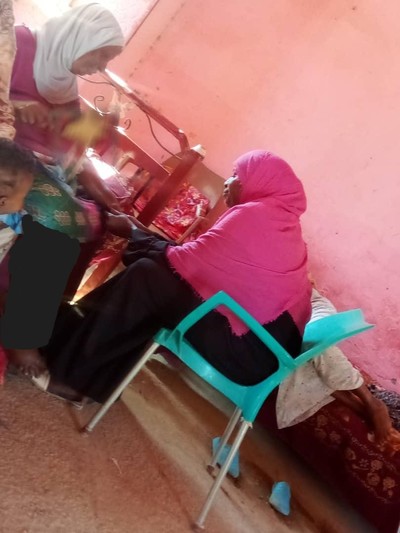
A picture taken during a home visit in Sudan, although it has been rare to see patients in person.
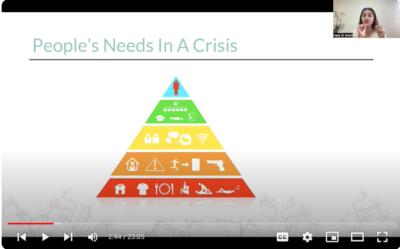
Training for Psychological First Aid was completed virtually through a video series for the palliative care unit, from SANAD.
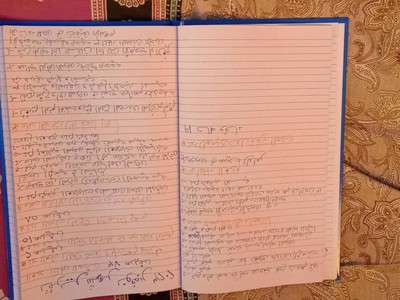
Notes for patients are collected and photographed to share with the doctors, like Dr Nahla Gafer. This is a summary of patients seen by Nurse Mahasin in November 2023.
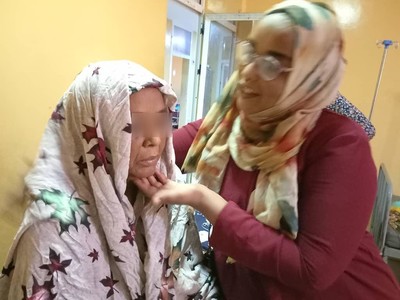
The palliative care unit continues to care for patients and families, even during this time of war.
